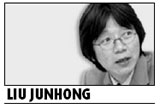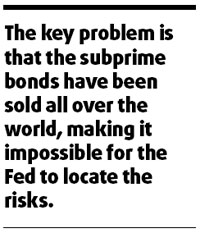Storm clouds over dollar system
By Liu Junhong (China Daily)
Updated: 2008-05-08 07:17
Updated: 2008-05-08 07:17

The subprime credit crunch has become a major headache for US President George W. Bush.
The problem has arisen because the United States, which always likes to tell other countries how to handle various crises, has failed time and again to cure its own "malignant tumor" despite heavy doses of "medication". But the best time for surgery slipped away, allowing the "malaise" to worsen and spread throughout the world like a financial "plague".
Worse is the fact that the subprime shockwave is shaking the daylight out of global financial markets, spilling aimless capital everywhere and causing the US dollar to depreciate to a point at which the very foundation of the US dollar system is no longer rock solid.
In fact, the US dollar was already falling against other major currencies as a result of ballooning US financial and trade deficit, keeping the world market on its toes even before the subprime scourge flared up.
To the US, however, the deficit-triggered dollar depreciation was just another "recurring itch" dating back to the 1970s that could be fixed with a scratch or two, such as introducing some protectionist policies to keep the dollar standing or perhaps lifting it higher temporarily.
Right now, however, the problem is that the subprime crisis was born of the financial globalization and liberalization the US has been pushing for in recent years. What it exposed is the loopholes in the US financial governing system, which is why it is also called a "financial capitalist crisis".
The US dollar depreciation and weakening of the foundation of the dollar system caused by this financial crisis, on the other hand, would need more than some policy tweaks to fix. For what we have seen so far a massive system reform is in order.
After the World War II the US established the reciprocal relationship between the US dollar and gold price by wielding its political, economic and military might as well as its monopoly on gold, thus building up a de facto US dollar system.
Particularly noteworthy is that, after two oil crises, the US began running "crude oil futures trading" on the New York Mercantile Exchange in 1983 in a bid to secure oil consumption interests. The oil future market required the US dollar be used as the sole trading currency. The move established the "oil pillar" for the US dollar system.
From then on the US dollar became some sort of common language in the world and was circulated around the globe easily, thanks to the lowest trading cost of the day.

Most of the other currencies thus had to rely on the US dollar as the choice medium to link with one another. The US dollar has become a currency "beyond the US"; while the dollar system became a tool for the US to make money and practice hegemony around the world.
Since the September 11 incident and especially the start of the war in Iraq, the prices of oil and other strategic resources have been rising and left the US dollar's status as the unrivaled trading currency in doubt. The oil-exporting countries in particular began to explore the feasibility of replacing the US dollar with the euro or the Japanese yen. The "oil pillar" of the US dollar system is now in danger of toppling.
The subprime crisis further exposed the defects of the capitalist financial system of the US in addition to directly jeopardizing the market foundation of the dollar system.
During the 1970s the dollar nearly collapsed, as oil prices surged and gold skyrocketed. The US used the New York Stock Exchange and its colossal trade deficit to play the role of a global supplier of (circulating) capital to protect and strengthen the dollar system. In this respect the global circulation of capital centered on the US and in the form of the US dollar has become a basic prop for the dollar system to remain standing.
In the 1990s, in order to secure the global circulation of capital, the US launched unprecedented financial liberalization following Britain's major financial reform by allowing banking, securities and insurance industries to tear down the business boundaries between them.
Investment banking, hedge funds, pension funds and commodity funds began to mushroom and ushered in the era of "fund capitalism". Financial derivatives soon swept through the world like floods, while new investment tools such as fixed assets and credit liabilities joined the list of trading options, forming a tide of "asset securitization" that threatened to inundate the world.
The US also demanded Japan and other economic powers to open up their financial markets for American capital, which brought about the so-called financial globalization and liberalization.
Unfortunately the US-led financial globalization and liberalization was let loose without an effective control mechanism to watch over it. The US self-proclaimed model of capitalism has been embarrassed by not only accounting scandals but also unethical behavior of market rating agencies and credit rating makeovers and hiding financial risks, with the subprime crisis being the prime example of credit risk gone wild.
Subprime loans represent a measure taken by the Bush administration after taking office to revitalize the US economy by boosting the property market. It works by encouraging banks to offer loans at relatively high interest rates to debtors with questionable credit records so as to allow more people to buy homes. It was supposed to stimulate the US property market, which is one of the main pillars of the US economy.
When the interest rate is low, property prices go up, while the buyers have little difficulty paying back the loans.
But, as the Federal Reserve raised interest rate repeatedly from June 2004 on, the risk of subprime credits rose as property prices fell. The key problem is that the subprime bonds have been sold all over the world, making it impossible for the Fed to locate the risks, let alone control them.
It could be said the US, by distributing financial risks throughout the world through financial globalization and liberalization, has delegated its financial power to other countries as well. Thus it is no longer a minor issue for the US to secure the dollar's position and the US dollar system as a whole.
The author is a researcher with China Institute of Contemporary International Relations
(China Daily 05/08/2008 page9)
|
|
|
|